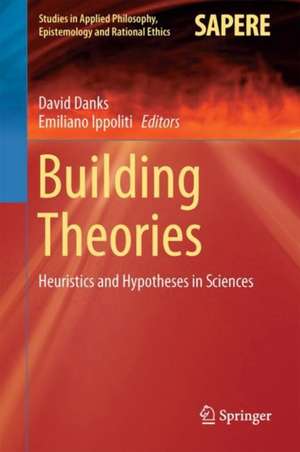Building Theories: Heuristics and Hypotheses in Sciences: Studies in Applied Philosophy, Epistemology and Rational Ethics, cartea 41
Editat de David Danks, Emiliano Ippolitien Limba Engleză Hardback – 26 ian 2018
| Toate formatele și edițiile | Preț | Express |
|---|---|---|
| Paperback (1) | 388.13 lei 6-8 săpt. | |
| Springer International Publishing – 4 iun 2019 | 388.13 lei 6-8 săpt. | |
| Hardback (1) | 397.59 lei 3-5 săpt. | |
| Springer International Publishing – 26 ian 2018 | 397.59 lei 3-5 săpt. |
Din seria Studies in Applied Philosophy, Epistemology and Rational Ethics
- 20%
 Preț: 603.89 lei
Preț: 603.89 lei -
 Preț: 359.53 lei
Preț: 359.53 lei - 20%
 Preț: 989.96 lei
Preț: 989.96 lei - 24%
 Preț: 787.48 lei
Preț: 787.48 lei -
 Preț: 390.08 lei
Preț: 390.08 lei -
 Preț: 370.88 lei
Preț: 370.88 lei - 15%
 Preț: 641.20 lei
Preț: 641.20 lei - 20%
 Preț: 991.60 lei
Preț: 991.60 lei - 20%
 Preț: 646.95 lei
Preț: 646.95 lei - 15%
 Preț: 653.98 lei
Preț: 653.98 lei -
 Preț: 384.48 lei
Preț: 384.48 lei -
 Preț: 395.47 lei
Preț: 395.47 lei - 18%
 Preț: 1216.95 lei
Preț: 1216.95 lei - 18%
 Preț: 947.50 lei
Preț: 947.50 lei -
 Preț: 388.72 lei
Preț: 388.72 lei -
 Preț: 390.08 lei
Preț: 390.08 lei -
 Preț: 395.09 lei
Preț: 395.09 lei -
 Preț: 394.12 lei
Preț: 394.12 lei - 15%
 Preț: 644.82 lei
Preț: 644.82 lei - 15%
 Preț: 698.15 lei
Preț: 698.15 lei - 18%
 Preț: 1840.91 lei
Preț: 1840.91 lei - 20%
 Preț: 656.84 lei
Preț: 656.84 lei -
 Preț: 389.70 lei
Preț: 389.70 lei - 20%
 Preț: 991.46 lei
Preț: 991.46 lei - 15%
 Preț: 585.73 lei
Preț: 585.73 lei - 15%
 Preț: 711.40 lei
Preț: 711.40 lei - 15%
 Preț: 589.33 lei
Preț: 589.33 lei - 15%
 Preț: 700.42 lei
Preț: 700.42 lei
Preț: 397.59 lei
Nou
Puncte Express: 596
Preț estimativ în valută:
76.08€ • 79.65$ • 62.95£
76.08€ • 79.65$ • 62.95£
Carte disponibilă
Livrare economică 17-31 martie
Preluare comenzi: 021 569.72.76
Specificații
ISBN-13: 9783319727868
ISBN-10: 3319727869
Pagini: 274
Ilustrații: X, 284 p. 24 illus., 5 illus. in color.
Dimensiuni: 155 x 235 mm
Greutate: 0.64 kg
Ediția:1st ed. 2018
Editura: Springer International Publishing
Colecția Springer
Seria Studies in Applied Philosophy, Epistemology and Rational Ethics
Locul publicării:Cham, Switzerland
ISBN-10: 3319727869
Pagini: 274
Ilustrații: X, 284 p. 24 illus., 5 illus. in color.
Dimensiuni: 155 x 235 mm
Greutate: 0.64 kg
Ediția:1st ed. 2018
Editura: Springer International Publishing
Colecția Springer
Seria Studies in Applied Philosophy, Epistemology and Rational Ethics
Locul publicării:Cham, Switzerland
Cuprins
Building theories: The heuristic way.- Building theories: Strategies not blueprints.- Richer than reduction.- Theory building as problem solving.- Discovering cures in medicine.- The product guides the process: Discovering disease mechanisms.- Take the case of a Geometer: Mathematical analogies and building theories in Aristotle.- Activation of the eddy mental schema, multiple analogies and their heuristic cooperation in the historical development of fluid dynamics.- Heuristic logic: A kernel.- The noetic account of scientific progress and the factivity of understanding.- Rhythms, retention and protention: Philosophical reflections on geometrical schemata for biological time.
Textul de pe ultima copertă
This book explores new findings on the long-neglected topic of theory construction and discovery, and challenges the orthodox, current division of scientific development into discrete stages: the stage of generation of new hypotheses; the stage of collection of relevant data; the stage of justification of possible theories; and the final stage of selection from among equally confirmed theories. The chapters, written by leading researchers, offer an interdisciplinary perspective on various aspects of the processes by which theories rationally should, and descriptively are, built. They address issues such as the role of problem-solving and heuristic reasoning in theory-building; how inferences and models shape the pursuit of scientific knowledge; the relation between problem-solving and scientific discovery; the relative values of the syntactic, semantic, and pragmatic view of theories in understanding theory construction; and the relation between ampliative inferences, heuristic reasoning, and models as a means for building new theories and knowledge. Through detailed arguments and examinations, the volume collectively challenges the orthodox view’s main tenets by characterizing the ways in which the different “stages” are logically, temporally, and psychologically intertwined. As a group, the chapters provide several attempts to answer long-standing questions about the possibility of a unified conceptual framework for building theories and formulating hypotheses.
Caracteristici
Describes new findings and models concerning the construction of theories and hypotheses in science Brings together both normative and descriptive perspectives on the question of theory construction Explores novel perspectives on the uses of models, inferences, and heuristic reasoning in theory-building Uses case studies in logic, mathematics, physics, biology, and psychology to develop a set of principles for how theories are constructed and refined
